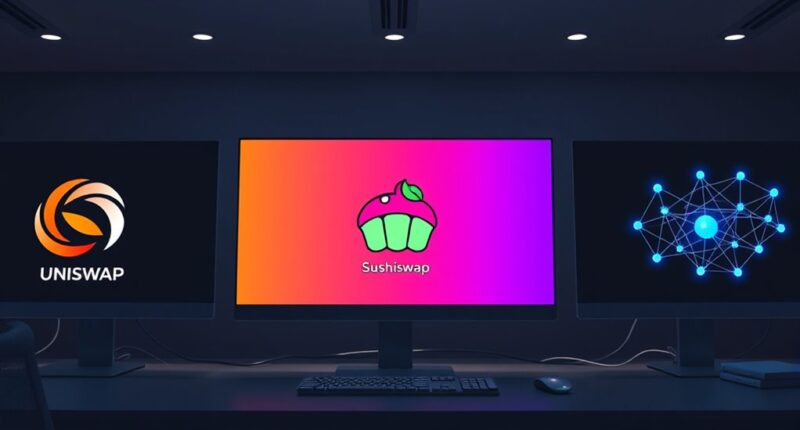If you’re comparing DeFi aggregator tokens like UNI, SUSHI, and 1INCH, you’ll find each offers unique benefits. UNI is mainly for governance and liquidity provision on Uniswap, while SUSHI emphasizes community decision-making with staking rewards. 1INCH acts as a multi-platform aggregator, finding the best prices across many exchanges. By understanding how each token enhances trading and governance, you’ll discover which aligns best with your DeFi goals. Keep exploring to learn more about their roles and features.
Key Takeaways
- Uniswap offers a simple AMM with governance via UNI tokens, focusing on straightforward swaps and liquidity pools.
- Sushiswap emphasizes community governance with its SUSHI token, integrating staking rewards and decision-making features.
- 1inch functions as a multi-platform aggregator, splitting trades across DEXs for better prices using its 1INCH token for governance.
- Uniswap and Sushiswap focus on liquidity provision and governance, while 1inch prioritizes optimized trade routing across multiple platforms.
- All three platforms incentivize user participation through governance tokens, aligning trading efficiency with community involvement.

Are you looking for a way to simplify your decentralized finance (DeFi) experience? If so, DeFi aggregator tokens can be a game-changer. These tokens streamline your interactions across multiple decentralized exchanges (DEXs), saving you time and effort. When you participate in liquidity provision, you often face the challenge of steering through different platforms and managing multiple assets. DeFi aggregators help by combining liquidity from various sources, giving you access to the best rates without jumping between platforms. Plus, many of these platforms reward liquidity providers with governance tokens, which grant you voting rights and a say in the platform’s future development.
Uniswap, Sushiswap, and 1inch are prominent players in this space, each offering unique approaches to aggregating liquidity and empowering users. Uniswap started as a simple AMM (automated market maker), but it has evolved to incorporate governance tokens like UNI. When you provide liquidity to Uniswap pools, you receive UNI tokens, which not only represent your share of the pool but also give you influence over protocol upgrades and fee models. This creates an incentive to participate actively in governance, aligning your interests with the platform’s growth. However, Uniswap’s focus remains on straightforward swaps and liquidity pools, which makes it accessible but sometimes less all-encompassing in routing trades across multiple platforms.
Uniswap offers simple swaps and liquidity pools, with governance tokens like UNI for active participation.
Sushiswap, a fork of Uniswap, emphasizes community governance and offers its own governance tokens, SUSHI. When you add liquidity to Sushiswap pools, you earn SUSHI tokens, which can be used to participate in governance votes or staked to earn additional rewards. Sushiswap’s approach encourages liquidity providers to become more involved, giving you a voice in decisions like fee adjustments or new features. Its aggregator capabilities are also notable, as it pulls liquidity from multiple sources to optimize trade execution, often providing better rates than individual DEXs.
1inch takes a different route by positioning itself as a dedicated aggregator that searches across many DEXs to find the best prices. When you trade through 1inch, it splits your order across different platforms, minimizing slippage and maximizing returns. 1inch also issues its own governance tokens, 1INCH, which you can earn by participating in the platform’s governance proposals or staking. This model offers you a high degree of control and transparency, especially if you’re looking to fine-tune your trading strategies without manually checking each DEX.
Frequently Asked Questions
How Do Defi Aggregator Tokens Impact Overall Defi Security?
DeFi aggregator tokens can both enhance and challenge security. They promote decentralized governance, empowering users to influence platform decisions, but also increase liquidity fragmentation, which can weaken overall network security. You might face higher risks from smart contract vulnerabilities across multiple platforms. However, well-implemented aggregators streamline transactions, reducing vulnerabilities. Ultimately, your security depends on the protocols’ robustness and how well they manage decentralized governance and liquidity distribution.
Can Aggregator Tokens Be Used Across Different Blockchain Networks?
You’re jumping in at the deep end, but yes, aggregator tokens can be used across different blockchain networks. They enable cross-chain compatibility through token interoperability, allowing seamless trading between multiple blockchains. This means you can access liquidity on various platforms without switching wallets or tokens. While some aggregators are working toward full cross-chain functionality, keep in mind that not all tokens or networks support this yet.
What Are the Risks of Holding Defi Aggregator Tokens?
Holding DeFi aggregator tokens exposes you to market volatility, which can cause sudden price swings, and liquidity risks, making it hard to sell your tokens quickly at fair value. You might face slippage during trades or difficulty converting tokens during high demand. Always stay aware of these risks, diversify your investments, and monitor market conditions closely to minimize potential losses.
How Do Fees Differ Among Uniswap, Sushiswap, and 1inch Tokens?
Like a knight’s armor in a medieval tale, fees vary among these platforms. Uniswap charges a flat 0.3% per liquidity pool token swap, Sushiswap is similar but sometimes offers incentives. 1inch aggregates multiple pools, so your fees may be lower, but it depends on the route chosen. You’ll pay for token swaps through gas fees and platform charges, which can fluctuate based on network congestion and liquidity pool activity.
Are There Any Regulatory Concerns Related to Defi Aggregator Tokens?
You should be aware that regulatory concerns exist with DeFi aggregator tokens due to legal uncertainties and regulatory compliance issues. Authorities are increasingly scrutinizing DeFi platforms, which could lead to future restrictions or legal actions. While these tokens offer innovative trading solutions, you need to stay informed about potential changes in regulations, as these could impact your ability to use or hold them safely within evolving legal frameworks.
Conclusion
Think of these DeFi aggregator tokens as your guiding compass in the vast ocean of decentralized finance. Each one offers a different lighthouse, illuminating paths to better trades and smarter investments. Choosing the right token is like selecting a trusted captain — it determines your journey’s success. Remember, in this decentralized world, your token is the symbol of your voyage’s direction, shaping your future navigation through the ever-changing currents of DeFi.









